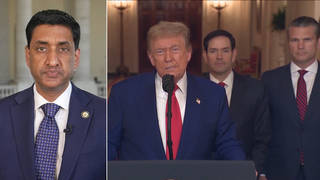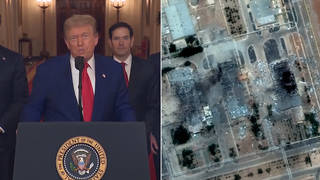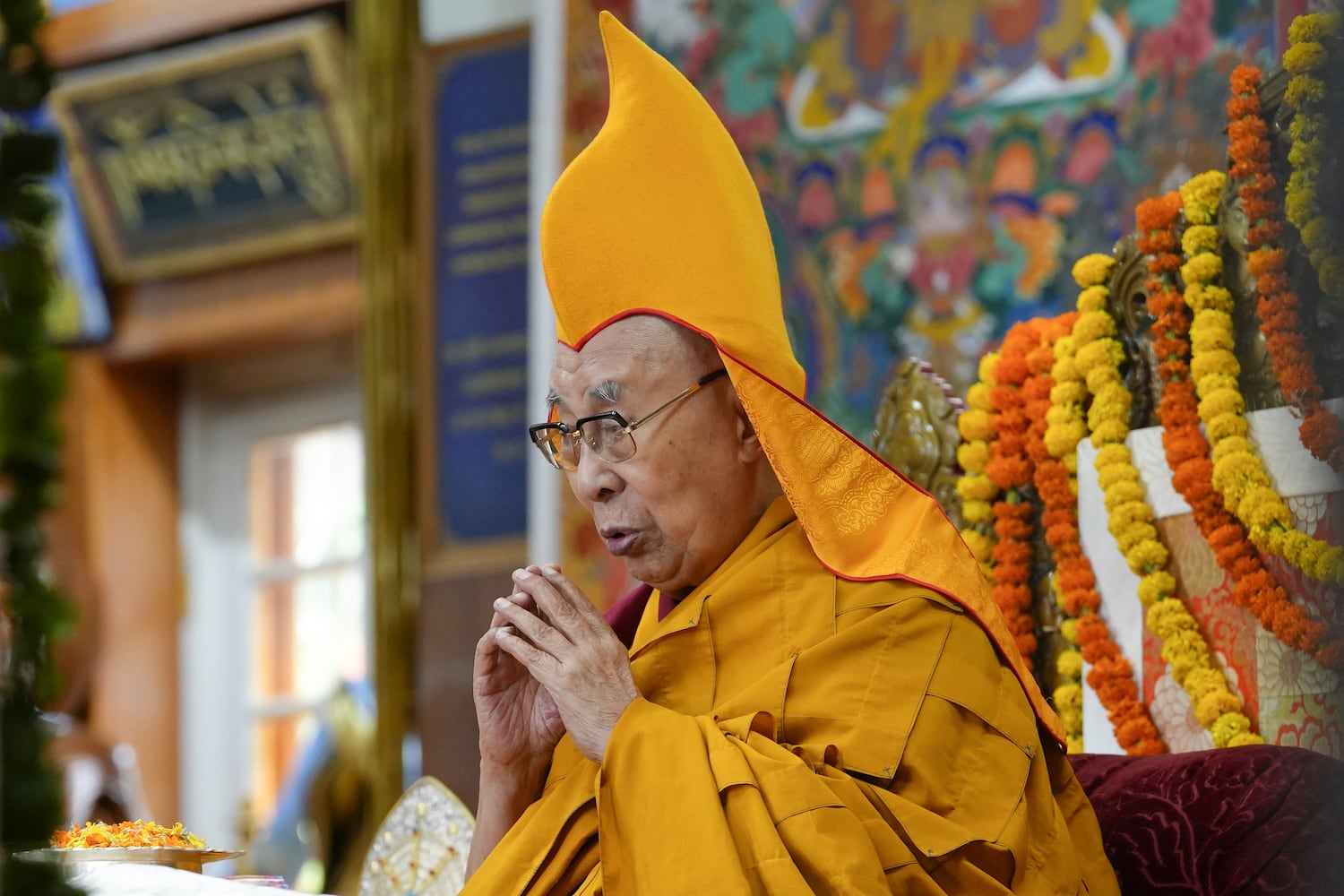This content originally appeared on Democracy Now! and was authored by Democracy Now!.
This post was originally published on Radio Free.
This content originally appeared on Democracy Now! and was authored by Democracy Now!.
This post was originally published on Radio Free.

“You can’t, as the president, engage in strikes on a foreign country when there’s no imminent threat, without coming to Congress for authorization,” says Ro Khanna, Democratic congressmember and member of the House Armed Services Committee, criticizing President Trump’s decision to bomb Iran’s nuclear sites as “blatantly unconstitutional” and a clear instance of executive overreach. Khanna and Republican congressmember Thomas Massie recently introduced a bipartisan Iran War Powers resolution in a bid to prevent further U.S. involvement in the Iran-Israel conflict. Khanna shares how anti-war voices in U.S. politics are too often silenced by powerful and wealthy interest groups and urges the Democratic Party to harness widespread anti-war sentiment in opposition to Trump’s increasingly authoritarian foreign policy.
This content originally appeared on Democracy Now! and was authored by Democracy Now!.
This post was originally published on Radio Free.
This content originally appeared on Democracy Now! and was authored by Democracy Now!.
This post was originally published on Radio Free.
This content originally appeared on Democracy Now! and was authored by Democracy Now!.
This post was originally published on Radio Free.
This content originally appeared on Democracy Now! and was authored by Democracy Now!.
This post was originally published on Radio Free.
This content originally appeared on Democracy Now! and was authored by Democracy Now!.
This post was originally published on Radio Free.

“Netanyahu’s purpose was to drag Trump in,” Daniel Levy, a former Israeli peace negotiator, says of the U.S. attack on Iran. Over the weekend, the U.S. directly joined the war between Israel and Iran when it bombed three nuclear facilities at Fordow, Natanz and Isfahan, though it’s unclear how far the strikes have set back the Iranian nuclear program. Israel and the United States accuse Iran of developing nuclear weapons, while Iran says its program is for civilian use. United Nations inspectors and U.S. intelligence assessments have said Iran is not building weapons. “The danger now is that, having brought the U.S. into this, Israel will seek to go further up the escalatory ladder,” says Levy. “It wants the chaos.”
This content originally appeared on Democracy Now! and was authored by Democracy Now!.
This post was originally published on Radio Free.

Israel and Iran continue to exchange fire, just days after the United States entered the war by bombing three key nuclear sites in Iran on Saturday. President Trump ordered the attack on the Fordow, Natanz and Isfahan facilities without seeking congressional approval, in a move that could spread further violence across the Middle East. We speak with two Iranian scholars who have taken part in the country’s previous nuclear negotiations. “Iranians see the United States as the aggressor, as helping the Israeli regime slaughter Iranians,” says University of Tehran professor Mohammad Marandi. “There’s anger across the board.” The U.S. and Israeli strikes on Iran are an “obvious” and “clear violation of international law and regulations,” says Seyed Hossein Mousavian, a visiting researcher at Princeton University who served as spokesperson for Iran in its nuclear negotiations with the European Union from 2003 to 2005.
This content originally appeared on Democracy Now! and was authored by Democracy Now!.
This post was originally published on Radio Free.
This content originally appeared on Democracy Now! and was authored by Democracy Now!.
This post was originally published on Radio Free.
This content originally appeared on Democracy Now! and was authored by Democracy Now!.
This post was originally published on Radio Free.
This content originally appeared on Democracy Now! and was authored by Democracy Now!.
As Israeli warplanes continue to pummel Tehran and other parts of the country, President Trump has given mixed messages on whether the U.S. will join Israel’s war on Iran. Trump’s press secretary Karoline Leavitt delivered a message on Thursday that Trump will decide on direct U.S. involvement in the next two weeks. Leavitt delivered the message shortly after Trump met with his former advisor Steve Bannon who has publicly warned against war with Iran. The U.S. is reportedly considering dropping “bunker buster” bombs on underground Iranian nuclear facilities. “It’s reminiscent of the beginning of the Iraq War, when they said it’s going to be a cakewalk,” says William Hartung, senior research fellow at the Quincy Institute for Responsible Statecraft.
A U.S.-based Iranian human rights group reports that the Israeli attacks have killed at least 639 people in Iran, while Iran’s retaliatory strikes in Israel have killed an estimated two dozen.
This content originally appeared on Democracy Now! and was authored by Democracy Now!.
This content originally appeared on Democracy Now! and was authored by Democracy Now!.
This post was originally published on Radio Free.
Ahead of the Dalai Lama’s 90th birthday on July 6, U.S. lawmakers have introduced bipartisan resolutions in both chambers of the U.S. Congress to honor the Tibetan spiritual leader and designate the anniversary as ‘A Day of Compassion.’
The resolution – introduced in the U.S. House of Representatives on Friday and in the Senate on Tuesday – reaffirms that only the Dalai Lama himself should determine his successor and that any attempt by Beijing to select or appoint one would be an “invalid interference” and violation of religious freedom rights.
China has sought greater control over Tibetan Buddhism since invading the independent Himalayan country in 1950 and forcing the Dalai Lama into exile in India in 1959. In 2007, Beijing announced it would oversee the recognition of all reincarnate Tibetan lamas, including the next Dalai Lama.
Senator Jeff Merkley (D-Oregon), who co-introduced the Senate resolution with Todd Young (R-Indiana), emphasized the broader stakes. “As the Chinese government continues to ignore the rights of Tibet under international law, we’re sending the message that we must protect these fundamental freedoms,” Merkley said.
In the House, Representatives Michael McCaul (R-Texas) and Jim McGovern (D-Massachusetts) introduced a similar resolution recognizing the Dalai Lama’s “outstanding contributions to peace, nonviolence, human rights, and religious understanding.”
“Despite having faced persecution, oppression, and unspeakable violence at the hands of the CCP, His Holiness the Dalai Lama has maintained inner peace and continues to preach compassion – inspiring not only his own people, but the entire world,” said McCaul. CCP refers to the Chinese Communist Party.
McCaul last year led a bipartisan Congressional delegation to Dharamsala, India, where he presented the Dalai Lama with a framed copy of a U.S. bill, that was later signed into law, in support of Tibetan people’s right to self-determination.
“The people of Tibet have an inalienable right to self-determination, and our resolution reaffirms the United States’ commitment to Tibetans by supporting their basic human rights, religious freedom, culture, and language,” said Merkley.

In recent years, China has sought to control the reincarnation process of Tibetan religious leaders in an apparent attempt to appoint the Dalai Lama’s successor.
But in his new book titled “Voice for the Voiceless,” the Dalai Lama has said that his successor would be born in the “free world,” which he described as outside China.
“The new Dalai Lama will be born in the free world so that the traditional mission of the Dalai Lama – that is, to be the voice for universal compassion, the spiritual leader of Tibetan Buddhism, and the symbol of Tibet embodying the aspirations of the Tibetan people – will continue,” the Dalai Lama said in the book.
The latest resolution reiterates that the selection and installation of Tibetan Buddhist religious leaders are within the authority of the Tibetan Buddhist community.
“I’m proud to stand with the Dalai Lama and the people of Tibet in their struggle for freedom and peace against the Chinese Communist Party’s continued aggression. The CCP’s status quo – both in Tibet and elsewhere – is not acceptable,” said Young.
The resolution is co-sponsored by a group of bipartisan lawmakers including Reps. Joe Wilson (R-S.C.), Raja Krishnamoorthi (D-Ill.), and Young Kim (R-Calif.), and Senators Jeanne Shaheen (D-NH), John Curtis (R-UT), and Dan Sullivan (R-AK).
Both resolutions have be approved by committee and then voted on by each chamber before passage.
Written by Tenzin Pema. Edited by Mat Pennington.
This content originally appeared on Radio Free Asia and was authored by RFA Tibetan.
This post was originally published on Radio Free.
This content originally appeared on Democracy Now! and was authored by Democracy Now!.
This post was originally published on Radio Free.
This content originally appeared on Democracy Now! and was authored by Democracy Now!.
This post was originally published on Radio Free.
This content originally appeared on Democracy Now! and was authored by Democracy Now!.
This post was originally published on Radio Free.
This content originally appeared on Democracy Now! and was authored by Democracy Now!.
This post was originally published on Radio Free.
This content originally appeared on Amnesty International and was authored by Amnesty International.
This post was originally published on Radio Free.
This content originally appeared on Democracy Now! and was authored by Democracy Now!.
This post was originally published on Radio Free.
This content originally appeared on Democracy Now! and was authored by Democracy Now!.
This post was originally published on Radio Free.
This content originally appeared on The Intercept and was authored by The Intercept.
This post was originally published on Radio Free.
This content originally appeared on Democracy Now! and was authored by Democracy Now!.
This post was originally published on Radio Free.
ProPublica is a nonprofit newsroom that investigates abuses of power. Sign up to receive our biggest stories as soon as they’re published.
This article is co-published with The Texas Tribune, a nonprofit, nonpartisan local newsroom that informs and engages with Texans. Sign up for The Brief Weekly to get up to speed on their essential coverage of Texas issues. It’s also co-published with Alianza Rebelde Investiga (Rebel Alliance Investigates), a coalition of Venezuelan online media outlets, and Cazadores de Fake News (Fake News Hunters), a Venezuelan investigative online news organization.
The Trump administration knew that the vast majority of the 238 Venezuelan immigrants it sent to a maximum-security prison in El Salvador in mid-March had not been convicted of crimes in the United States before it labeled them as terrorists and deported them, according to U.S. Department of Homeland Security data that has not been previously reported.
President Donald Trump and his aides have branded the Venezuelans as “rapists,” “savages,” “monsters” and “the worst of the worst.” When multiple news organizations disputed those assertions with reporting that showed many of the deportees did not have criminal records, the administration doubled down. It said that its assessment of the deportees was based on a thorough vetting process that included looking at crimes committed both inside and outside the United States. But the government’s own data, which was obtained by ProPublica, The Texas Tribune and a team of journalists from Venezuela, showed that officials knew that only 32 of the deportees had been convicted of U.S. crimes and that most were nonviolent offenses, such as retail theft or traffic violations.
The data indicates that the government knew that only six of the immigrants were convicted of violent crimes: four for assault, one for kidnapping and one for a weapons offense. And it shows that officials were aware that more than half, or 130, of the deportees were not labeled as having any criminal convictions or pending charges; they were labeled as only having violated immigration laws.
As for foreign offenses, our own review of court and police records from around the United States and in Latin American countries where the deportees had lived found evidence of arrests or convictions for 20 of the 238 men. Of those, 11 involved violent crimes such as armed robbery, assault or murder, including one man who the Chilean government had asked the U.S. to extradite to face kidnapping and drug charges there. Another four had been accused of illegal gun possession.
We conducted a case-by-case review of all the Venezuelan deportees. It’s possible there are crimes and other information in the deportees’ backgrounds that did not show up in our reporting or the internal government data, which includes only minimal details for nine of the men. There’s no single publicly available database for all crimes committed in the U.S., much less abroad. But everything we did find in public records contradicted the Trump administration’s assertions as well.
ProPublica and the Tribune, along with Venezuelan media outlets Cazadores de Fake News (Fake News Hunters) and Alianza Rebelde Investiga (Rebel Alliance Investigates), also obtained lists of alleged gang members that are kept by Venezuelan law enforcement officials and the international law enforcement agency Interpol. Those lists include some 1,400 names. None of the names of the 238 Venezuelan deportees matched those on the lists.
The hasty removal of the Venezuelans and their incarceration in a third country has made this one of the most consequential deportations in recent history. The court battles over whether Trump has the authority to expel immigrants without judicial review have the potential to upend how this country handles all immigrants living in the U.S., whether legally or illegally. Officials have suggested publicly that, to achieve the president’s goals of deporting millions of immigrants, the administration was considering suspending habeas corpus, the longstanding constitutional right allowing people to challenge their detention.
Hours before the immigrants were loaded onto airplanes in Texas for deportation, the Trump administration invoked the Alien Enemies Act of 1798, declaring that the Tren de Aragua prison gang had invaded the United States, aided by the Venezuelan government. It branded the gang a foreign terrorist organization and said that declaration gave the president the authority to expel its members and send them indefinitely to a foreign prison, where they have remained for more than two months with no ability to communicate with their families or lawyers.
Lee Gelernt, the lead attorney in the American Civil Liberties Union’s legal fight against the deportations, said the removals amounted to a “blatant violation of the most fundamental due process principles.” He said that under the law, an immigrant who has committed a crime can be prosecuted and removed, but “it does not mean they can be subjected to a potentially lifetime sentence in a foreign gulag.”
White House spokesperson Abigail Jackson said in response to our findings that “ProPublica should be embarrassed that they are doing the bidding of criminal illegal aliens who are a threat,” adding that “the American people strongly support” the president’s immigration agenda.
When asked about the differences between the administration’s public statements about the deportees and the way they are labeled in government data, DHS Assistant Secretary Tricia McLaughlin largely repeated previous public statements. She insisted, without providing evidence, that the deportees were dangerous, saying, “These individuals categorized as ‘non-criminals’ are actually terrorists, human rights abusers, gang members and more — they just don’t have a rap sheet in the U.S.”
As for the administration’s allegations that Tren de Aragua has attempted an invasion, an analysis by U.S. intelligence officials concluded that the gang was not acting at the direction of the Venezuelan government of Nicolás Maduro and that reports suggesting otherwise were “not credible.” Tulsi Gabbard, Trump’s director of national intelligence, fired the report’s authors after it became public. Her office, according to news reports, said Gabbard was trying to “end the weaponization and politicization” of the intelligence community.
Our investigation focused on the 238 Venezuelan men who were deported on March 15 to CECOT, the prison in El Salvador, and whose names were on a list first published by CBS News. The government has also sent several dozen other immigrants there, including Kilmar Abrego Garcia, a Salvadoran man who the government admitted was sent there in error. Courts have ruled that the administration should facilitate his return to the U.S.
We interviewed about 100 of the deportees’ relatives and their attorneys. Many of them had heard from their loved ones on the morning of March 15, when the men believed they were being sent back to Venezuela. They were happy because they would be back home with their families, who were eager to prepare their favorite meals and plan parties. Some of the relatives shared video messages with us and on social media that were recorded inside U.S. detention facilities. In those videos, the detainees said they were afraid that they might be sent to Guantanamo, a U.S. facility on Cuban soil where Washington has held and tortured detainees, including a number that it suspected of plotting the 9/11 terrorist attacks. The Trump administration had sent planes carrying Venezuelan immigrants there earlier this year.
They had no idea they were being sent to El Salvador.
Among them was 31-year-old Leonardo José Colmenares Solórzano, who left Venezuela and his job as a youth soccer coach last July. His sister, Leidys Trejo Solórzano, said he had a hard time supporting himself and his mother and that Venezuela’s crumbling economy made it hard for him to find a better paying job. Colmenares was detained at an appointment to approach the U.S.-Mexico border in October because of his many tattoos, his sister said. Those tattoos include the names of relatives, a clock, an owl and a crown she said was inspired by the Real Madrid soccer club’s logo.
First image: Colmenares’ mother, Marianela Solórzano, and sister at their home in Venezuela. Second image: Photos of Colmenares as a child in Venezuela. (Adriana Loureiro Fernández for ProPublica and The Texas Tribune)Colmenares was not flagged as having a criminal history in the DHS data we obtained. Nor did we find any U.S. or foreign convictions or charges in our review. Trejo said her brother stayed out of trouble and has no criminal record in Venezuela either. She described his expulsion as a U.S.-government-sponsored kidnapping.
“It’s been so difficult. Even talking about what happened is hard for me,” said Trejo, who has scoured the internet for videos and photos of her brother in the Salvadoran prison. “Many nights I can’t sleep because I’m so anxious.”
The internal government data shows that officials had labeled all but a handful of the men as members of Tren de Aragua but offered little information about how they came to that conclusion. Court filings and documents we obtained show the government has relied in part on social media posts, affiliations with known gang members and tattoos, including crowns, clocks, guns, grenades and Michael Jordan’s “Jumpman” logo. We found that at least 158 of the Venezuelans imprisoned in El Salvador have tattoos. But law enforcement sources in the U.S., Colombia, Chile and Venezuela with expertise in the Tren de Aragua told us that tattoos are not an indicator of gang membership.
McLaughlin, the DHS spokesperson, said the agency is confident in its assessments of gang affiliation but would not provide additional information to support them.
John Sandweg, a former acting director of Immigration and Customs Enforcement, said, “for political reasons, I think the administration wants to characterize this as a grand effort that’s promoting public safety of the United States.” But “even some of the government’s own data demonstrates there is a gap between the rhetoric and the reality,” he said, referring to the internal data we obtained.
The government data shows 67 men who were deported had been flagged as having pending charges, though it provides no details about their alleged crimes. We found police, court and other records for 38 of those deportees. We found several people whose criminal history differed from what was tagged in the government data. In some cases that the government listed as pending criminal charges, the men had been convicted and in one case the charge had been dropped before the man was deported.
Our reporting found that, like the criminal convictions, the majority of the pending charges involved nonviolent crimes, including retail theft, drug possession and traffic offenses.
Six of the men had pending charges for attempted murder, assault, armed robbery, gun possession or domestic battery. Immigrant advocates have said removing people to a prison in El Salvador before the cases against them were resolved means that Trump, asserting his executive authority, short-circuited the criminal justice system.
Take the case of Wilker Miguel Gutiérrez Sierra, 23, who was arrested in February 2024 in Chicago on charges of attempted murder, robbery and aggravated battery after he and three other Venezuelan men allegedly assaulted a stranger on a train and stole his phone and $400. He pleaded not guilty. Gutiérrez was on electronic monitoring as he awaited trial when he was arrested by ICE agents who’d pulled up to him on the street in five black trucks, court records show. Three days later he was shipped to El Salvador.
But the majority of men labeled as having pending cases were facing less serious charges, according to the records we found. Maikol Gabriel López Lizano, 23, was arrested in Chicago in August 2023 on misdemeanor charges for riding his bike on the sidewalk while drinking a can of Budweiser. His partner, Cherry Flores, described his deportation as a gross injustice. “They shouldn’t have sent him there,” she said. “Why did they have to take him over a beer?”
Jeff Ernsthausen of ProPublica contributed data analysis. Adriana Núñez and Carlos Centeno contributed reporting.
This content originally appeared on ProPublica and was authored by .
This post was originally published on Radio Free.
This content originally appeared on Human Rights Watch and was authored by Human Rights Watch.
This post was originally published on Radio Free.
This content originally appeared on Democracy Now! and was authored by Democracy Now!.
This post was originally published on Radio Free.
This content originally appeared on Democracy Now! and was authored by Democracy Now!.
This post was originally published on Radio Free.
This content originally appeared on Democracy Now! and was authored by Democracy Now!.
This post was originally published on Radio Free.